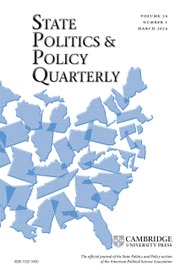Crossref Citations
This article has been cited by the following publications. This list is generated based on data provided by
Crossref.
Boehmke, Frederick J.
and
Pacheco, Julianna
2016.
Introduction to SPPQ Special Issue on Policy Diffusion.
State Politics & Policy Quarterly,
Vol. 16,
Issue. 1,
p.
3.
Latham, Kenzie
2016.
“Taking a Turn for the Better”: Does Self-reported Recovery From Walking Limitation Improve Disability and Mortality Outcomes?.
The Journals of Gerontology Series B: Psychological Sciences and Social Sciences,
p.
gbw113.
Boehmke, Frederick J.
Rury, Abigail Matthews
Desmarais, Bruce A.
and
Harden, Jeffrey J.
2017.
The Seeds of Policy Change: Leveraging Diffusion to Disseminate Policy Innovations.
Journal of Health Politics, Policy and Law,
Vol. 42,
Issue. 2,
p.
285.
Kastellec, Jonathan P.
2018.
How Courts Structure State-Level Representation.
State Politics & Policy Quarterly,
Vol. 18,
Issue. 1,
p.
27.
Tallberg, Jonas
Lundgren, Magnus
Sommerer, Thomas
and
Squatrito, Theresa
2020.
Why International Organizations Commit to Liberal Norms.
International Studies Quarterly,
Vol. 64,
Issue. 3,
p.
626.
Mooney, Christopher Z.
2020.
The Study of US State Policy Diffusion.
Parinandi, Srinivas C.
2020.
Policy Inventing and Borrowing among State Legislatures.
American Journal of Political Science,
Vol. 64,
Issue. 4,
p.
852.
An, Brian
Butz, Adam
Cha, Min-kyeong
and
Mitchell, Joshua
2021.
Dynamic Policy Diffusion in the Metropolis: Unpacking Spatial and Ideological Dimensions of Local Climate Policy Adoption in Southern California.
SSRN Electronic Journal,
LaCombe, Scott J.
and
Boehmke, Frederick J.
2021.
The Initiative Process and Policy Innovation in the American States.
State Politics & Policy Quarterly,
Vol. 21,
Issue. 3,
p.
286.
Hansen, Eric R.
and
Jansa, Joshua M.
2021.
Complexity, resources and text borrowing in state legislatures.
Journal of Public Policy,
Vol. 41,
Issue. 4,
p.
752.
Mallinson, Daniel J.
2021.
Policy Innovation Adoption Across the Diffusion Life Course.
Policy Studies Journal,
Vol. 49,
Issue. 2,
p.
335.
Bricker, Christine
and
LaCombe, Scott
2021.
The Ties that Bind Us: The Influence of Perceived State Similarity on Policy Diffusion.
Political Research Quarterly,
Vol. 74,
Issue. 2,
p.
377.
Mallinson, Daniel J.
2021.
Who Are Your Neighbors? The Role of Ideology and Decline of Geographic Proximity in the Diffusion of Policy Innovations.
Policy Studies Journal,
Vol. 49,
Issue. 1,
p.
67.
Boehmke, Frederick J.
2022.
Advice on Presenting Material in Graduate Methods Courses for Different Learning Styles.
PS: Political Science & Politics,
Vol. 55,
Issue. 1,
p.
242.
Woo, Byung-Deuk
2022.
The Impacts of Gender-Related Factors on the Adoption of Anti-Human Trafficking Laws in Sub-Saharan African Countries.
Sage Open,
Vol. 12,
Issue. 2,
LaCombe, Scott J.
Tolbert, Caroline
and
Mossberger, Karen
2022.
Information and Policy Innovation in U.S. States.
Political Research Quarterly,
Vol. 75,
Issue. 2,
p.
353.
Smith, Kelly B.
Hill, David
and
Ancheva, Slavina
2023.
Divergent Electoral Policies: Why Some States Increase Ballot Access.
State Politics & Policy Quarterly,
Vol. 23,
Issue. 1,
p.
26.
Nicholson‐Crotty, Sean
Nicholson‐Crotty, Jill
and
Lee, Euipyo
2023.
Police unions and use‐of‐force reforms in American cities.
Policy Studies Journal,
Vol. 51,
Issue. 4,
p.
887.
An, Brian Y.
M. Butz, Adam
Cha, Min-Kyeong
and
Mitchell, Joshua L.
2023.
Following neighbors or regional leaders? Unpacking the effect of geographic proximity in local climate policy diffusion.
Policy Sciences,
Vol. 56,
Issue. 4,
p.
825.
Bae, Young
Woo, Byung-Deuk
Jung, Sungwon
Lee, Eunchae
Lee, Jiin
Lee, Mingu
and
Park, Haegyun
2023.
The Relationship Between Government Response Speed and Sentiments of Public Complaints: Empirical Evidence From Big Data on Public Complaints in South Korea.
Sage Open,
Vol. 13,
Issue. 2,


